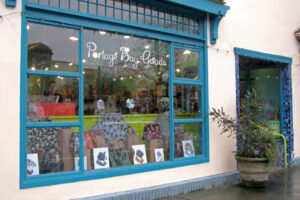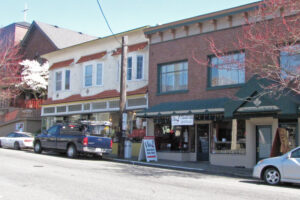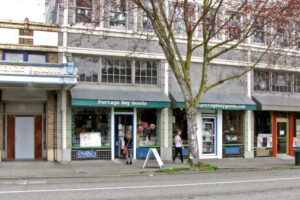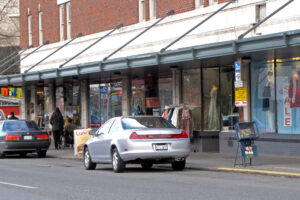by Kirby Lindsay Laney, posted 25 November 2013

Over the years, Fremont has had dozens and dozens of people open up retail and restaurant businesses here – and many, many more muse about doing it.
Many people don’t understand the reality of retail, and the risky venture opening a business can be, until they try it.
To help those who might, and those who shouldn’t, one of Fremont’s most established retailers recently sat down and talked about the details of small business ownership.
Falling Into It
Sue Sanem owns Portage Bay Goods, a regular stop for Fremont shoppers and ‘thoughtful procrastinators,’ and she knows about those who think owning a store is romantic, or an easy way to make moola.
Sanem can reluctantly recall a day when a vendor came in her store – a day when bills, employees, and/or rent woes were particularly unbearable – and mentioned their dream of owning their own store. Sanem reacted instinctively, and with what she now describes as an unnecessarily discouraging, ‘Are you crazy?’

“I kind of fell into it,” Sanem explained about her route to retail. She’d been working as store manager when she agreed to take over ownership of Portage Bay in 2001. The original owner, Betsy Davis, had decided to close – or sell.
While she’s worked the store many, many years, lately, Sanem has realized that retailing doesn’t suit her as much as her work in bookkeeping. Her staff keep Portage Bay operating, while she actually works full-time (with benefits) as the ‘Fiscal Specialist’ in the radiology department of the University of Washington. “In my late 40s,” she said, “I’m so grateful for the cubical.” It comes in handy to have a regular income, and hours, as she and her husband raise their sons.
‘They Still Want It’
“I truly couldn’t work at my other job without Shalene [Lundgren] and Lauren [Rathburn],” Sanem insisted. Lundgren serves as store manager, with Rathburn as second-in-command, and her cohort in keeping the store operating. “I really enjoy the accounting side of it,” Sanem said of retail, “but not the purchasing and marketing side.”

“There is a whole lot of money sitting on the shelves,” Sanem explained, “the person buys a product on Christmas Eve to pay the vendor who shipped it in October, and manufactured it in April.” Lundgren and Rathburn have to order those items in August that sell in the Christmas season. “You have to be supplying something that if people don’t need it, they still want it,” Sanem observed.
“People can have unrealistic expectations,” Sanem said of her limited complaints. Shoppers can be disappointed when the store no longer carries a particular product, or fails to stock one at all. “Vendors require orders by the dozen,” she explained, “We want to provide good customer service, but not at the expense of having stock sitting around.”
“Merchandizing a small store,” Sanem mused, “it’s like dominos…” Beyond just stocking products, placement is huge. Moving one item to the front means putting something else in the back – and a tchotchke placed beside a toy may help each sell, or distract attention from both. A book placed next to the cash register might sell better when placed near the door, or the window…
‘What Is Selling’
“We have to keep inventory at minimal levels,” Sanem explained, “about enough to keep people happy.” Sanem credits Lundren, and Rathburn with great sense for the items customers will want, and putting together displays that generate sales. “We have all these sales reports,” Sanem said – tracking what sold, and when – “and they order based on what is selling.”

Sanem dedicates one-half of sales income, or store gross revenue, to purchase products. “The vendors do, eventually, get paid,” she said, smiling, but she will do short pay or split payments to get to everyone, sometimes. Some vendors require credit card payments, before shipping, which can create a juggling act for Lundgren to guarantee the store will have the products it needs.
Payroll Priority
Running second in order of expense is payroll, at 24% of gross revenue. Sanem tries to pay a ‘liveable wage,’ although she acknowledged it isn’t really enough for her employees to buy a home, or probably live alone. She lost a great manager who needed a larger income, and Sanem realistically accepts that can happen.
Sanem doesn’t fear a potential $15 minimum wage. “We would be able to adapt,” she said, “but it would keep us from hiring people who don’t have any experience.”

While Lundgren now does the hiring, Sanem has done it. “If your stomach hurts after the interview,” she advised, “but you hire them anyway, it was probably a mistake.” She also regrets hiring a manager while staying on as a clerk. “I was feeling overwhelmed,” she recalled, “I wanted somebody with retail experience to come in with a plan for the store,” but then she found it difficult to trust another’s vision.
“I am so grateful,” Sanem said about her current employees. “It is so rare that somebody can’t come in and do their shift,” she said. The store gets open, and stays open, with rare occasions of unhappy customers. “I don’t have the luxury of paying them to stand around,” Sanem said, but “I have to have enough people not to have them be overwhelmed.”
Of course, Sanem depends on Lundgren and Rathburn, and her other part-time employees, for more than just opening the door. They manage on-line sales, marketing, meeting vendors, merchandising (and remerchandising,) cleaning, and, well, helping customers. “I also have them doing my filing,” Sanem admitted sheepishly. “All I have to do is pay the bills, and payroll if it’s on the weekend,” she said, “and file the quarterly taxes.”

From Bad Space To Good
Portage Bay has an on-line presence, but it is a brick-and-mortar store – and pays 10% of its gross revenues for rent (12% of the monthly expenses.) Next year, Sanem hopes to be able to renew her lease. She has moved the store once, and could do it again, but “I don’t know if [Shalene and Loren] could survive another move,” she joked. The move, 2 ½ years ago, brought them to a smaller space, but one with significantly more foot traffic.
As to her previous location, “it had become a bad space,” Sanem observed, “we couldn’t get people over from the [Fremont] Sunday Market.” Davis originally opened Portage Bay, in 1998, in a store front across the street from the ‘People Waiting for the Interurban’ sculpture, and in a decade the neighboring store fronts emptied out – and shoppers began to shun the area – so Sanem finally found a new space, paid to remodel it and got to relocate her stock, staff and customers.
‘Pretty Nimble’

For the previous location Sanem paid, “a weird little tax,” as she described it, on the awnings that hung over the sidewalk. Today, she doesn’t have any of these small bureaucratic bites to pay, and she finds her quarterly taxes, “pretty straight-forward.” The store, due to its small staff, is exempt from sick pay, although she described the Labor & Industries taxes as “a killer,” particularly as the Portage Bay staff have yet to suffer injuries from standing on ladders, or paper cuts. Still, if the City, or State, do decide to charge her per telephone poles, parking spaces or sidewalks depth, Sanem shrugged, “we can be pretty nimble.”
An ability to adapt and change is one reason small businesses survive. Sanem still won’t enthusiastically endorse retailing as a brilliant business move – “it wasn’t the best financial decision I ever made,” she acknowledged. Still, in speaking with her, her obvious enjoyment in the experiences she’s had, and those she continues to have, shines through.
The majority of Fremont’s retailers – and restaurants – remain small, independents like Portage Bay. Please support these local entrepreneurs, as they provide what we need – and what we want.
Related Articles
- What Fremont Employers Want
- by Kirby Lindsay, April 18, 2012
- Portage Bay Goods Brings Irreverence Closer To The Center
- by Kirby Lindsay, April 13, 2011
©2013 Kirby Lindsay. This column is protected by intellectual property laws, including U.S. copyright laws. Reproduction, adaptation or distribution without permission is prohibited.

